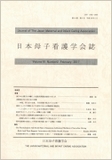Japanese
English
- 有料閲覧
- Abstract 文献概要
- 参考文献 Reference
目的
本研究の目的は、福島県内の開業助産師が、東日本大震災によってどのようなゆらぎを体験し、何にゆらぎながら母子支援継続をしていたのか、そのゆらぎの過程を明らかにすることである。
対象と方法
研究デザインは質的記述的研究である。研究対象は、福島県内で開業助産師として2011年3月以前から活動し、震災後1年以上助産業務を続けていた開業助産師7名である。データは、対象者に東日本大震災後の様子や思いについての語りをインタビューガイドに基づく半構成的面接法で収集した。分析は、面接内容を逐語録としてデータ化し、研究テーマに関連した内容を抽出しカテゴリー化した。
結果
分析の結果、11のゆらぎのカテゴリーと27のサブカテゴリーが抽出された。震災直後の混乱期は【混乱による衝撃的な体験に伴う無力感】【自己判断に基づく母子支援ができない不全感】【被災者としての体験に伴う葛藤】の3つのカテゴリーと9つのサブカテゴリーで構成された。震災の混乱が落ち着き始めた頃は、【母と向き合う自信が崩れそうな不安】【なんとか母子に寄り添い続ける】【福島の母に感じる誇り】【助産師会との関係性の変化】【助産師としての生きがいの喪失】の5つのカテゴリーと12のサブカテゴリーで構成された。震災から約2年を経過した頃は【助産師としての大切なものの再確認】【新たな活動の意義を見出す】【助産師としてのワークスタイルの模索】の3つのカテゴリー、6つのサブカテゴリーで構成された。
結論
ゆらぎの過程は、開業助産師としての職業的アイデンティティ崩壊の危機とその再構築の過程であった。ゆらぎを乗り越え職業的アイデンティティ再構築に進みさらなる成長を遂げた開業助産師と、いきがいの喪失体験の受容過程にあり、未だにゆらぎ続けながらも、助産師として立ち止まることなく活動を続けた開業助産師がいた。
Purpose
The purpose of this study was to investigate the mental instability that private practice midwives in Fukushima experienced after the Great East Japan Earthquake, and what created the mental instability in said midwives while providing support to mothers and children.
Subjects and Methods
This is a qualitative descriptive study. Seven subjects were included, all of whom were active private practice midwives in Fukushima before, during, and more than one year after the Great East Japan Earthquake.
Semi-constitutive interviews based on the interview guide were conducted to obtain the midwives' thoughts and experiences of the earthquake. The interviews were then transcribed verbatim, and analyzed by extracting and categorizing the contents relevant to the study.
Results
As a result of the analysis, 11 categories and 27 subcategories of mental instability were extracted. The precedent requirements of mental instability was confusion resulting from the earthquake and subsequent radiation disaster. The confusion period just after the earthquake was divided into 3 categories: a [feeling of helplessness from a shocking experience by the confusion]; a [feeling of imperfection from not being able to use their own self-judgment when providing support to mothers and children]; and [conflicts accompanied by the experience as a victim], and 9 subcategories were extracted. The period when the confusion reduced fell into 5 categories: [anxiety of losing confidence to face mothers]; [continuing to stay by mothers and children in some way]; [feeling proud of mothers in Fukushima]; [change in the relationship with midwives associations]; and [losing motivation in their job]; and 12 subcategories were established. As a consequence of mental instability, two categories, [reconfirming individual goals as a midwife] and [finding significance in their work], as well as 4 subcategories, were derived from the data of midwives whose mental instability was relieved. Regarding those in whom mental instability remained, the category [grope of work style as a midwife], and 2 subcategories were derived.
Conclusion
The midwives' mental instability went through a process of crisis and reconstruction of professional identity as a practice midwife. There were midwives who promoted the reconstruction of their professional identity, and achieved further growth by overcoming the mental instability, and those who were in the process of accepting the experience of their motivation loss, and continued working as a midwife while suffering from mental instability.
Copyright © 2017, The Japan Maternal and Infant Caring Association All rights reserved.


